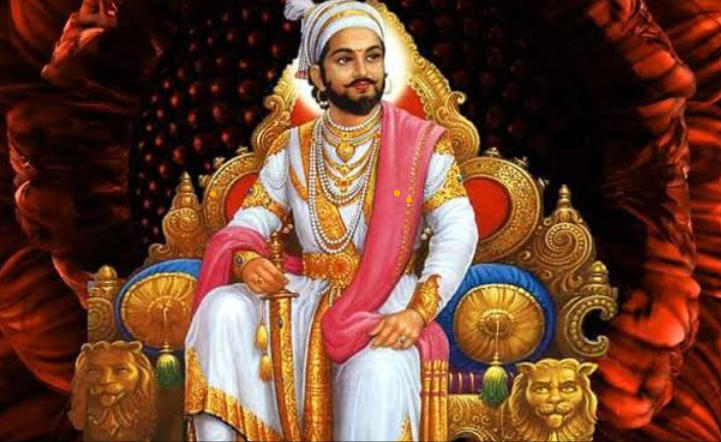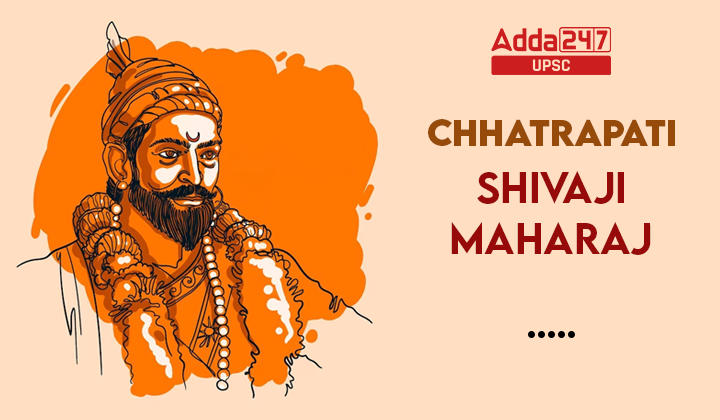Table of Contents
Chhatrapati Shivaji Maharaj
Chhatrapati Shivaji Maharaj, a legendary figure in Indian history, was born on February 19, 1630, in Shivneri, a fort near Pune. He was the founder of the Maratha Empire and is hailed as a charismatic warrior, visionary leader, and a symbol of valor and statesmanship. Shivaji’s life and reign left an indelible mark on the Indian subcontinent, shaping the course of history and inspiring generations to come.

Early Life and Education Chhatrapati Shivaji Maharaj
- Shivaji’s early life was shaped by influential figures, with his mother, Jijabai, playing a central role.
- Jijabai instilled in Shivaji a strong sense of pride and love for his motherland, providing him with a foundation for his future endeavors.
- Inspired by his mother’s teachings and stories of great warriors, Shivaji harbored dreams of establishing an independent kingdom.
- Jijabai’s influence laid the groundwork for Shivaji’s unwavering determination to fight against oppression and protect his people.
- Shivaji embraced the idea of nationalism, prioritizing the welfare and prosperity of his subjects above all.
- His vision encompassed a land free from foreign rule, where every citizen would have the opportunity to thrive and prosper.
- The ideology of nationalism became the driving force behind Shivaji’s actions throughout his life, guiding his battles and conflicts.
- Shivaji’s commitment to creating a sovereign and prosperous nation fueled his enduring struggle against external forces.
Formation of the Maratha Kingdom
- Shivaji’s military prowess became evident at an early age when he undertook guerrilla warfare against the oppressive rule of the Bijapur Sultanate. His strategic acumen and swift tactics allowed him to capture the Torna Fort at the age of 16 in 1646, marking the beginning of his quest for establishing a sovereign Maratha kingdom.
- The crowning moment in Shivaji’s military campaigns was the capture of the impregnable fortress of Raigad in 1674, where he was crowned Chhatrapati, meaning “paramount sovereign.” This marked the formal establishment of the Maratha Empire, and Shivaji adopted a coronation name, Chhatrapati Shivaji Maharaj.
Administration Under Chhatrapati Shivaji Maharaj
- During Shivaji’s rule, he set up a strong government for the Maratha Kingdom. This government focused on running things well and taking care of the people. Shivaji divided the central government into different parts, each in charge of specific tasks.
- Collecting taxes was really important for keeping the kingdom prosperous. Shivaji made changes to how taxes were collected to make sure it was fair and efficient. His goal was to share wealth fairly and look out for the well-being of farmers, making the economy stable and promoting growth.
- Having a powerful military was also crucial during Shivaji’s time. He understood this and put effort into building a strong army. Shivaji used smart military tactics, stressed the importance of training and discipline, and made sure his soldiers felt loyal and patriotic.
Administrative Reforms By Shivaji Maharaj
Shivaji Maharaj established the administrative framework known as the Ashtapradhan, comprising eight departments that collaborated to effectively govern the Maratha kingdom.
The eight departments were:
- Peshwa: Responsible for both civil and military affairs.
- Sachiva: Managed and maintained records of Shivaji Maharaj’s directives.
- Amatya: Oversaw tax collection and controlled the treasury.
- Nyayadhyaksha: Han5dled court cases and the justice system.
- Senapati: Served as the commander of the armed forces.
- Sumant: Managed spies, diplomats, and an intelligence network.
- Panditrao: In charge of religious and cultural matters.
- Ajaynya: Managed the king’s palace affairs and attended to the king’s personal needs.
Each member of the Ashtapradhan had specific duties
- The Peshwa conveyed Shivaji Maharaj’s orders at royal meetings.
- The Sachiva organized and stored important documents.
- The Amatya collected taxes and allocated funds for various plans.
- The Nyayadhyaksha traveled to different locations to address people’s court cases.
- The Senapati supervised soldiers and formulated war strategies.
- The Sumant handled diplomatic relations and maintained an intelligence network.
- The Panditrao provided counsel on religious and cultural matters.
- The Ajaynya managed daily operations at the king’s palace.
The Ashtapradhan departments collaborated closely, with each having equal power. Regular meetings facilitated the exchange of information and coordination of efforts, resulting in efficient administration. Shivaji Maharaj’s Ashtapradhan system succeeded because its specialized departments worked harmoniously, akin to the well-coordinated components of an efficient machine, dedicated to serving the kingdom. This administrative structure endured beyond Shivaji Maharaj’s era.
Naval Expansion and Fortification
Recognizing the strategic importance of a robust navy, Shivaji developed a formidable maritime force. He established a navy that not only protected the Konkan coastline but also challenged the European powers in the region. Under his leadership, the Maratha navy became a force to be reckoned with, enhancing trade and maritime security.
Shivaji also undertook an extensive fortification program, strengthening existing forts and constructing new ones. This foresight played a crucial role in protecting his kingdom from external invasions and contributed to the longevity of the Maratha Empire.
Religious Tolerance and Social Policies
Shivaji was known for his religious tolerance and inclusive policies. He treated people of all faiths with respect and ensured that his administration reflected the pluralistic ethos of the Indian subcontinent. His commitment to justice and fairness endeared him to people from diverse backgrounds, fostering a sense of unity and belonging within his realm.
Death of Chhatrapati Shivaji Maharaj
The passing of Shivaji in 1680 signified the conclusion of a significant era, yet his influence endured, serving as an enduring source of inspiration for generations to follow. His dream of establishing an autonomous Maratha Kingdom and his steadfast dedication to his people left an indelible imprint on the tapestry of Indian history. Shivaji’s innovative military tactics, administrative advancements, and fervent nationalism not only shaped the trajectory of his time but also laid a sturdy foundation for subsequent leaders, contributing to the enduring legacy of the Maratha Empire.
Legacy of Chhatrapati Shivaji Maharaj
Chhatrapati Shivaji Maharaj’s legacy extends far beyond the boundaries of his empire. His life and achievements have inspired countless leaders and thinkers, and his principles of governance and military strategy continue to be studied and admired. The Maratha Empire, under his rule, became a beacon of hope for those who sought freedom from tyranny.
Battles of Chhatrapati Shivaji Maharaj
Chhatrapati Shivaji Maharaj, the founder of the Maratha Empire in western India, was a brilliant military strategist and a charismatic leader. Throughout his reign from 1674 to 1680, Shivaji engaged in numerous battles that shaped the destiny of the Maratha kingdom. Here are some notable battles in the military career of Chhatrapati Shivaji Maharaj:
Battle of Pratapgad
- Shivaji faced Afzal Khan, a general of the Bijapur Sultanate.
- Despite being outnumbered, Shivaji’s strategic brilliance and skilled warriors led to a resounding victory.
- Solidified Shivaji’s reputation as a formidable warrior.
- Established the Maratha Kingdom as a force to be reckoned with.
Battle of Pavan
- Shivaji confronted the combined forces of the Adilshahi and Qutbshahi kingdoms.
- Despite overwhelming odds, Shivaji’s tactical genius and valor resulted in a significant victory.
- Expanded the Maratha Kingdom’s influence.
- Further established Shivaji as a respected leader.
Capture of Surat
- Shivaji captured the prosperous city of Surat, then under Mughal rule.
- Showcased Shivaji’s military prowess.
- Demonstrated his ability to challenge the mighty Mughal Empire.
Battle of Purandar
- Shivaji faced the combined forces of the Mughal Empire and the Bijapur Sultanate.
- The battle ended in a compromise.
- Shivaji’s negotiating skills secured favorable terms.
- Allowed him to retain his territories and continue the pursuit of an independent Maratha Kingdom.
Battle of Sinhagad
- Shivaji and his troops scaled the treacherous cliffs of Sinhagad Fort.
- Aimed to reclaim it from Mughal forces.
- Symbolized Shivaji’s unwavering spirit and determination.
- Demonstrated his commitment to defending his kingdom against all odds.
| Relatable Article | |
| Mughal Empire | Mughal Emperor Akbar |



 TSPSC Group 1 Question Paper 2024, Downl...
TSPSC Group 1 Question Paper 2024, Downl...
 TSPSC Group 1 Answer key 2024 Out, Downl...
TSPSC Group 1 Answer key 2024 Out, Downl...
 UPSC Prelims 2024 Question Paper, Downlo...
UPSC Prelims 2024 Question Paper, Downlo...




